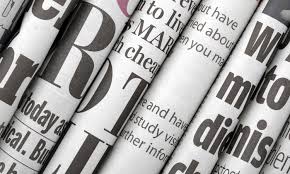Stopping the Presses
Advertising and people's habits abandon print media Dec 10 2016The mainstream press is in a fix. Year after year, as advertisers follow readers to the Internet, the life-support of advertising linage has dropped. In the third quarter alone, print ads declined 15% for Gannett, the largest newspaper publisher (its flagship is USA Today), 17% at McClatchy (The Miami Herald and The Sacramento Bee among others), 19% at The New York Times and 21% at The Wall Street Journal, which is cutting staff and has already eliminated sections as economy measures. Meanwhile, digital ad revenue for newspapers has barely grown, taking four years to increase from $3 billion to only $3.5 billion between 2010 and 2014.
We are rapidly losing the ranks of trained journalists as newsrooms shrink, a fraternity
drawn by its mission "to root out corruption, hold the powerful accountable and sort fact from fiction". And if that drew snickers, you really don't know about journalists. Why else would they chose the demanding and low-paying profession?
It has become fashionable to disparage the principal practitioners of journalism, lumping all together under the somewhat patronizing 
"mainstream media" label. They are dismissed as irredeemably biased, often by those who never read a newspaper or magazine. Without question, certain of the media went out of the bounds of objectivity during the presidential campaign. Christiane Amanpour faulted the media "for the exceptionally high bar it put before one candidate and the exceptionally low bar it put before another". Television, especially CNN, failed — the most extraordinary example being, in its shameful lust for ratings, CNN and Fox taking live phone calls from Donald Trump while on air.
Bias exists but it should not be mistaken for lying. In the campaign for the presidency, The New York Times was accused of bias because of its heavy reporting on Trump — his refusal to submit his tax returns, his fondness for Putin, his startling policy pronouncements such as the resumption of water-boarding, his Atlantic City business failures that ran counter to his boasts that as a successful businessman he alone could fix everything. There was no end of material to report about the most unusual candidate for the presidency of our lifetimes. While the often-long investigative reports had the effect of favoring Clinton, that does not mean the information brought to light was false. Those who label such reporting as biased seem to argue that it should not have been reported at all, that Americans should not have asked questions about the Republican candidate and now President-elect. But this is not China.
This new world of billions who spend their days burrowed into smartphones, values news by its entertainment value, its popularity, and that is a corrosive factor for traditional journalism. At the very least, opinion has seeped into the news columns as the media are forced to compete for attention. A headline as subjective and presumptive as "Trump's Breezy Calls to Leaders Leave Diplomats Slack-Jawed" would never have made it into the Times — page one above the fold at that — as recently as a decade ago. But the article does report actual phone calls and comments from abroad — which is to say, factual reporting that we should know about, not fake news.
Democracy is fragile. It relies on the people believing in the honesty and integrity of the system. A culture rife with lies spreading distrust and cynicism is likely to destroy the tenuous cohesion of its social order. To the economic threat against the media, about to be added the political threat of a president who detests the media and wants to see the libel laws relaxed.
The press, digging to get at the truth, is the vital bulwark against the subterfuges of secret government and other institutions of power. Is it wise for us to add to this alarming erosion of print media by continuing to distrust all serious media categorically? Without serious consideration? Have we looked ahead to see where this leads? If we abandon rather than support, journalism as we've known it will die out. What, then, is left? The Times national political correspondent recently tweeted, "Folks, subscribe to a paper. Democracy demands it". We'll go that one better; subscribe to more than one, the Times and the Journal, The Nation and The Weekly Standard. Because if that mainstream media dies, we'll be left getting all our news from Facebook, and where will they get it from?
Please subscribe if you haven't, or post a comment below about this article, or
click here to go to our front page.


Even more sinister is I can only imagine that possibly the most biased broadcast news station-Fox News- will be the favored “mouthpiece’ as they were the only “fair” media outlet to the new administration which publicaly complained about the unfair reporting of all the other media outlets.